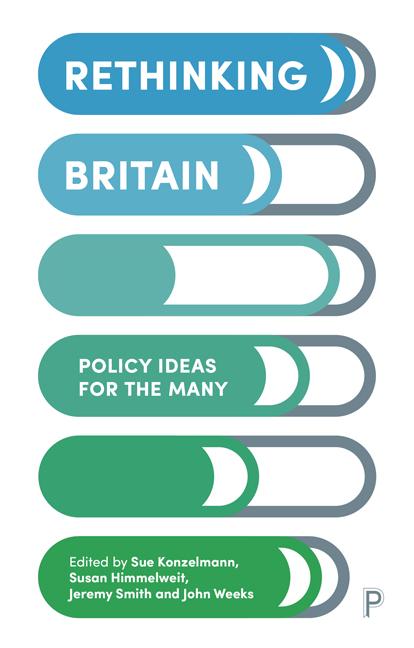Book contents
- Frontmatter
- Contents
- List of Tables and Figures
- The Contributors
- Foreword
- Introduction
- Interlude: ‘Mirror, Mirror, On the Wall – Who has the Highest Debt of All?’
- Part One Building a Full-Employment Economy: Introduction
- Part Two Public Investment – Prioritising Society Rather than Profit: Introduction
- Part Three Making Finance Work for Society: Introduction
- Part Four Genuine Social Security: Introduction
- Part Five How to provide for Social Needs: Introduction
- Conclusion
- Jargon Busters
- References and Further Reading
- Index
4 - Wage Policy and Public Investment for Sustainable Development
Published online by Cambridge University Press: 11 March 2021
- Frontmatter
- Contents
- List of Tables and Figures
- The Contributors
- Foreword
- Introduction
- Interlude: ‘Mirror, Mirror, On the Wall – Who has the Highest Debt of All?’
- Part One Building a Full-Employment Economy: Introduction
- Part Two Public Investment – Prioritising Society Rather than Profit: Introduction
- Part Three Making Finance Work for Society: Introduction
- Part Four Genuine Social Security: Introduction
- Part Five How to provide for Social Needs: Introduction
- Conclusion
- Jargon Busters
- References and Further Reading
- Index
Summary
What's the issue?
Since 1980, obsessively market-based policies have given Britain very high levels of inequality, as well as the worst investment and productivity record in the developed world. Reconstructing this broken system will require a set of policies based on public investment, plus labour market policies for equality-led growth – and a more bounded role for markets.
How can we effectively address high inequality, low investment and poor productivity?
Analysis
Stagnant wages, caused by decades of attacks on trade unions, zero-hours contracts, self-employment practices and public sector cuts and pay freezes, have led to high household debt – and the unsustainable British debt-led consumption-driven growth model. Higher – and smarter – public investment is the key to producing better jobs, reducing inequality and supporting ecological and social sustainability. This will require well-planned, green physical infrastructure, as well as systems supporting social care, health, education and childcare.
Green physical infrastructure priorities should include renewable energy, public transport, social housing and the improvement of the existing housing stock. Investment in health and social care, education and childcare will have long-term benefits for society – improving productivity by supporting a higher-skilled and healthier labour force.
Improving gender equality would also increase productivity, as a result of more women joining the paid labour force. Spending on universal health and social care, education and childcare could be financed by both borrowing and tax revenues, since it adds to valuable – and productive – social infrastructure. Both the Organisation for Economic Co-operation and Development (OECD) and the International Monetary Fund (IMF) support borrowing for public infrastructure investment, particularly as interest rates are currently low.
The public spending and investment priorities in the 2017 Labour Party manifesto were criticised on the assumption that progressive taxation of income, wealth and corporate profits to provide finance for public spending would reduce private investment and productivity. But this view totally ignores the positive impact these policies would have on demand, productivity and, thus, private investment, and it is one of the ideas that produced the problems we now have. But it is not the only one. Current policy is based on two further ideas, both of which are also highly suspect. The first is the notion that a further decrease in the corporate tax rate will somehow be the magic bullet to solve our productivity puzzle.
- Type
- Chapter
- Information
- Rethinking BritainPolicy Ideas for the Many, pp. 76 - 79Publisher: Bristol University PressPrint publication year: 2019



